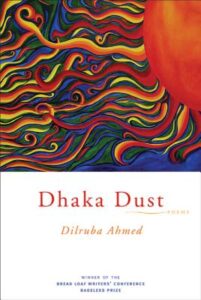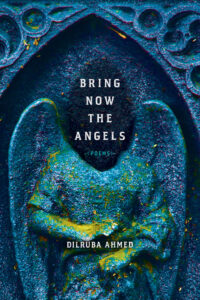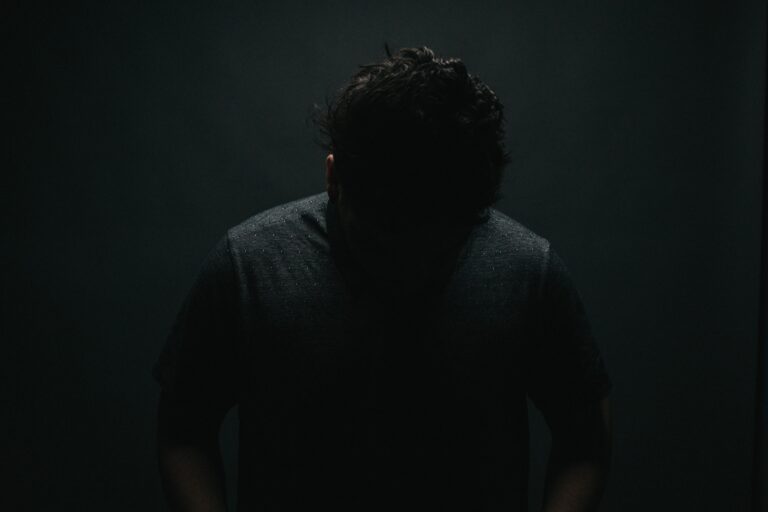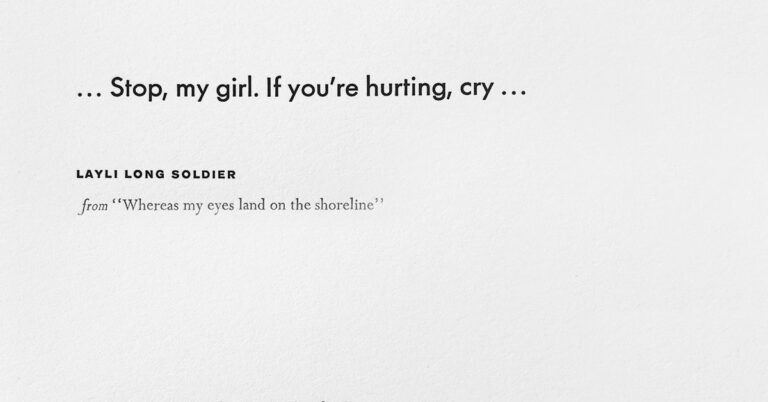Dilruba Ahmed
Phase One
What do you find hard to forgive in yourself? What might help?
In this poem, the poet makes a list of all the things she holds against herself: opening fridge doors, fantasies, wilted seedlings, unkempt plants, lost bags, feeling awkward, treating someone poorly. Dilruba Ahmed repeats the line “I forgive you” over and over, like a litany, in a hope to deepen what it means to be in the world, and be a person of love.
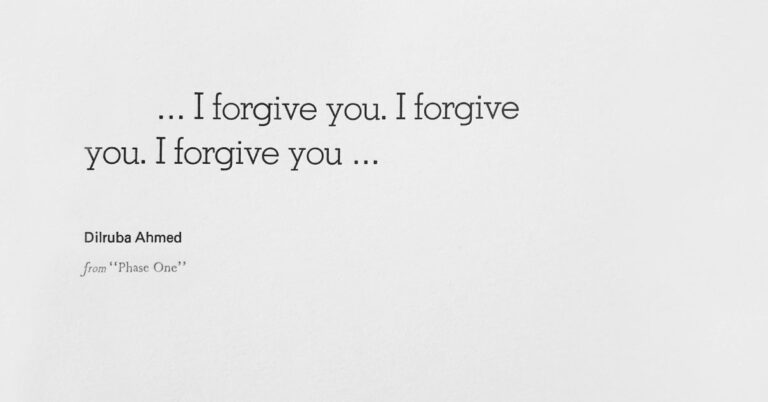
Image by Expedition Press/Expedition Press, © All Rights Reserved.
Guest

Dilruba Ahmed is the author of the collection Bring Now the Angels and poems featured in New York Times Magazine, The Slowdown, and The Best American Poetry 2019. Her debut book of poetry, Dhaka Dust, won the Bakeless Prize. Ahmed is part of the MFA faculty at Warren Wilson College’s MFA Program for Writers and Chatham University’s MFA Program, and teaches regularly with Hugo House and The Writing Lab.
Transcript
Pádraig Ó Tuama: My name is Pádraig Ó Tuama, and the longer that I’ve written poetry and read poetry, I realize that poetry is asking me to be brave, to go into the moments of my own failure and to narrate those, not as projects of self-hatred, but as projects of observation, in the possibility that I might be able to offer some kind of compassion in the space of a poem to the self that’s writing, as well as, from that, begin to offer compassion in the wider world.
[music: “Praise The Rain” by Gautam Srikishan]
Ó Tuama: “Phase One” by Dilruba Ahmed:
“For leaving the fridge open
last night, I forgive you.
For conjuring white curtains
instead of living your life.
For the seedlings that wilt, now,
in tiny pots, I forgive you.
For saying no first
but yes as an afterthought.
I forgive you for hideous visions
after childbirth, brought on by loss
of sleep. And when the baby woke
repeatedly, for your silent rebuke
in the dark, “What’s your beef?”
I forgive your letting vines
overtake the garden. For fearing
your own propensity to love.
For losing, again, your bag
en route from San Francisco;
for the equally heedless drive back
on the caffeine-fueled return.
I forgive you for leaving
windows open in rain
and soaking library books
again. For putting forth
only revisions of yourself,
with punctuation worked over,
instead of the disordered truth,
I forgive you. For singing mostly
when the shower drowns
your voice. For so admiring
the drummer you failed to hear
the drum. In forgotten tin cans,
may forgiveness gather. Pooling
in gutters. Gushing from pipes.
A great steady rain of olives
from branches, relieved
of cruelty and petty meanness.
With it, a flurry of wings, thirteen
gray pigeons. Ointment reserved
for healers and prophets. I forgive you.
I forgive you. For feeling awkward
and nervous without reason.
For bearing Keats’s empty vessel
with such calm you worried
you had, perhaps, no moral
center at all. For treating your mother
with contempt when she deserved
compassion. I forgive you. I forgive
you. I forgive you. For growing
a capacity for love that is great
but matched only, perhaps,
by your loneliness. For being unable
to forgive yourself first so you
could then forgive others and
at last find a way to become
the love that you want in this world.”
[music: “Every Place We’ve Been” by Gautam Srikishan]
Ó Tuama: One of the questions that you always ask when you read a poem is, Who is the speaker in the poem? The speaking voice of the poem isn’t always the poet. Sometimes they take on a persona, or they adopt an all-knowing point of view, speaking to themself in the past, from the vantage point of the present — or the future, even. And the first time I read this poem, I thought, Who is this speaker? They sound like a total dick. And then it became clear to me, as the poem went on, that the speaker in the poem had such intimate knowledge of the person they were speaking to that it could only be a person speaking to themself, because they know so much. And then I thought, Oh, they don’t sound horrible. They sound intimately aware of the things that we hold against ourselves.
And that’s what I think this poem is about, in many ways, the things we hold against ourselves that prevent us from being loving in the moment, because we’re so caught up, perhaps, in the stories of failure, some of them deserved, and some of them not deserved, the stories of failure that we hold against ourselves from our past, or from the ideal version of ourselves that we think we should be.
[music: “First Grief, First Air ” by Gautam Srikishan]
Ó Tuama: This person seems to be tired a lot, seems to be in a rush. They’re exhausted from parenting. They forget things. They are concerned about how they are perceived, and they are trying to appear perfect. And they’re giving themselves forgiveness for all those things, and treating their mother poorly. And they’re filled with capacities for love and loneliness. All of these things in this poem seem to be deserving of forgiveness.
The really interesting thing in this poem is that the word “forgive” occurs 13 times. And then that phrase, “I forgive you,” occurs six times. The first time, it appears just as a single sentence. It occurs just by itself, those three words, “I forgive you.” And then the next time it appears, it occurs twice, “I forgive you. I forgive you.” And then the final time it appears, it’s three times: “I forgive you. I forgive you. I forgive you.” It’s like this poem is trying to learn a mantra to say to itself, and in the hope that a life can learn a mantra to say to itself, knowing that saying it once isn’t enough and, also, that forgiveness is something that we return to over and over again, even self-forgiveness — that it needs to be a mantra. It needs to be a thing we say to ourselves, in order to get out of our way, in order to be able to love.
That’s the really interesting part of the final part of this poem, is that it says, “to forgive yourself first so you / could then forgive others and / at last find a way to become / the love that you want in this world.” This poem is saying that self-forgiveness isn’t the end. Self-forgiveness is the beginning, in order to be able to love.
And that makes you think of the title, then, “Phase One.” This is just the first step in the project of being human and in the project of being human at this age, whatever age the speaker of the poem is. I love that Dilruba Ahmed has done this in such a way to say that self-forgiveness comes early so that all these other things can come after that; so that you can be present to your life without holding the life that you never had, against yourself, in such a way that you might never live the life that you have.
[music: “What Did You Not Hear” by Gautam Srikishan]
Ó Tuama: I think sometimes there can be a concern that a focus on self-forgiveness is somehow selfish. But the focus on self-forgiveness is, in a certain sense, trying to remove yourself from being always the center of the drama of the public life you’re living.
And what this poem is saying, and what I think self-forgiveness does, is to recognize that if we are holding enormous things against ourselves, it can be very difficult to be present and loving in those moments. If you are spending so much of your energy putting yourself at the center of your story and hating yourself, it can be very difficult to be present with other people, because we do tend to give to others what we’ve given to ourselves. And if we’re constantly sharpening an iron against ourselves, well, then, we might be using that same iron against the people that we meet, whether those are small encounters on the bus or encounters with a partner or our children or somebody else that we live with or see regularly. And so, I think, starting with yourself in this moment might be the beginning of having a place of practice where you can start, then, with others.
And those things are reciprocal. You can give to others what can be difficult to give to yourself, but sometimes, when you give something to yourself, it can make it easier to give to others, as well. You can begin to imagine being compassionate to them, because you’ve had to do the hard work of being compassionate to yourself.
[music: “Ashed to Air” by Gautam Srikishan]
Ó Tuama: For many years I led a project that looked at forgiveness. I must’ve read hundreds of definitions of forgiveness. But the one I keep on coming back to is, holding something against someone. That someone might be yourself. And to hold something against someone requires energy. They mightn’t even know it.
Like if I’ve been angry at somebody, they mightn’t know that most mornings, do you know, while I’m having a cup of tea, I rehearse that argument that I wish that I’d had with them and that final, declarative, tour de force of a comeback that I wished I’d given. I might be stoking the fire of anger for a week or a month or a year. And I’m holding something against them. They mightn’t even know it, but I’m spending a lot of energy with that up against them. And that is deepening the pain. And I think it is giving a lot of attention somewhere where I would hope, perhaps, we could give attention creatively.
There’s all kinds of reasons why we get caught in anger, and anger is a magnificent and important defense. And if forgiveness is ever to happen, there needs to be a level of safety. And sometimes anger is a reminder to ourselves that safety hasn’t been achieved, yet, so anger is the protection. And anger has a deep intelligence in that moment.
But the intuition of this poem is that the forgiveness that Dilruba Ahmed is offering to herself is a forgiveness that’s freeing, that’s opening her up to being present to other people in love.
[music: “The House You Wake In” by Gautam Srikishan]
Ó Tuama: I think this is a very, very humble poem. And I think it can be very difficult for somebody to say, “Let me make a list of the things that I think I should forgive myself for,” because if you haven’t forgiven yourself for something, the likelihood is, is that you think you don’t deserve forgiveness for something. So maybe the invitation of this poem is to make a list of the things that you hold against yourself.
And I think about the times that I have held things against myself, times when I’ve disappointed people; and then, certainly, when I had responsibility, not being able to live up to the idea of myself, about who I’d be when I had responsibility; times when I’ve hurt a partner, hurt family and friends — those are the kinds of things that I think, I don’t deserve forgiveness, so I don’t even want to make a list of the things I should forgive myself for, because I don’t think I deserve to make that list. But these are certainly the things I hold against myself. And I hold them over me. And what might it mean for me to repeat “I forgive you” in increasing repetitions, about — this poem stops at three repetitions, so maybe I need 50. But it invites us, I think, to consider those things, especially when we don’t think we deserve them.
“Phase One” by Dilruba Ahmed:
“For leaving the fridge open
last night, I forgive you.
For conjuring white curtains
instead of living your life.
For the seedlings that wilt, now,
in tiny pots, I forgive you.
For saying no first
but yes as an afterthought.
I forgive you for hideous visions
after childbirth, brought on by loss
of sleep. And when the baby woke
repeatedly, for your silent rebuke
in the dark, “What’s your beef?”
I forgive your letting vines
overtake the garden. For fearing
your own propensity to love.
For losing, again, your bag
en route from San Francisco;
for the equally heedless drive back
on the caffeine-fueled return.
I forgive you for leaving
windows open in rain
and soaking library books
again. For putting forth
only revisions of yourself,
with punctuation worked over,
instead of the disordered truth,
I forgive you. For singing mostly
when the shower drowns
your voice. For so admiring
the drummer you failed to hear
the drum. In forgotten tin cans,
may forgiveness gather. Pooling
in gutters. Gushing from pipes.
A great steady rain of olives
from branches, relieved
of cruelty and petty meanness.
With it, a flurry of wings, thirteen
gray pigeons. Ointment reserved
for healers and prophets. I forgive you.
I forgive you. For feeling awkward
and nervous without reason.
For bearing Keats’s empty vessel
with such calm you worried
you had, perhaps, no moral
center at all. For treating your mother
with contempt when she deserved
compassion. I forgive you. I forgive
you. I forgive you. For growing
a capacity for love that is great
but matched only, perhaps,
by your loneliness. For being unable
to forgive yourself first so you
could then forgive others and
at last find a way to become
the love that you want in this world.”
Lily Percy: “Phase One” comes from Dilruba Ahmed’s, Bring Now the Angels. Thank you to the University of Pittsburgh Press who gave us permission to use Dilruba’s poem. You can find a link to the poem in our show notes, along with Pádraig’s guiding question for this episode.
Poetry Unbound is Chris Heagle, Erin Colasacco, Serri Graslie, Eddie Gonzalez, Lilian Vo, Christiane Wartell, Karen Navarre, Karyn Towey, Sue Ariza, and me, Lily Percy. Our music is composed and provided by Gautam Srikishan and Blue Dot Sessions. This podcast is produced by On Being Studios, which is located on Dakota land. We also produce other podcasts you might enjoy, like On Being with Krista Tippett, Becoming Wise, and This Movie Changed Me — find those wherever you like to listen or visit us at onbeing.org to find out more.
Books & Music
Recommended Reading
The On Being Project is an affiliate partner of Bookshop.org and Amazon.com. Any earnings we receive through these affiliate partnerships go into directly supporting The On Being Project.





